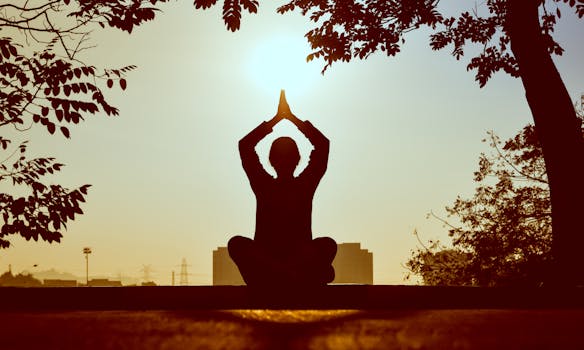
Anxiety is a common experience that can affect anyone at any time. It can be overwhelming and debilitating, but there are effective ways to manage it. One powerful tool for anxiety relief is meditation. This guide will explore how meditation can help alleviate anxiety and provide practical tips to get you started.
Understanding Anxiety
What is Anxiety? Anxiety is a natural response to stress, characterized by feelings of worry, nervousness, or fear. While occasional anxiety is normal, chronic anxiety can interfere with daily life and well-being.
Symptoms of Anxiety:
- Excessive worry
- Restlessness
- Fatigue
- Difficulty concentrating
- Irritability
- Muscle tension
- Sleep disturbances
Causes of Anxiety: Anxiety can be triggered by various factors, including genetics, brain chemistry, personality, and life events. Understanding the root cause of your anxiety can help in managing it effectively.
The Benefits of Meditation for Anxiety
Meditation is a practice that involves focusing the mind and eliminating distractions to achieve a state of mental clarity and emotional calm. It has been used for centuries to promote relaxation and well-being. Here are some ways meditation can help with anxiety:
1. Reduces Stress: Meditation activates the body’s relaxation response, reducing the production of stress hormones like cortisol. This helps lower overall stress levels and promotes a sense of calm.
2. Enhances Self-Awareness: Meditation encourages mindfulness, which involves being present in the moment and observing your thoughts and feelings without judgment. This heightened self-awareness can help you recognize and manage anxiety triggers more effectively.
3. Improves Emotional Regulation: Regular meditation practice can improve your ability to regulate emotions, making it easier to respond to stressful situations with calmness and clarity.
4. Promotes Better Sleep: Anxiety often disrupts sleep, leading to a vicious cycle of fatigue and increased anxiety. Meditation can help calm the mind, making it easier to fall asleep and stay asleep.
5. Boosts Overall Well-Being: Meditation has been shown to improve overall mental health, increasing feelings of happiness, contentment, and resilience.
Getting Started with Meditation
Starting a meditation practice can be simple and accessible. Here are ten tips to help you get started:
1. Find a Quiet Space: Choose a quiet, comfortable place where you won’t be disturbed. This could be a corner of your room, a spot in your garden, or any place where you feel at ease.
2. Set a Time: Decide on a specific time for your meditation practice. Morning is often recommended as it sets a positive tone for the day, but any time that works for you is fine.
3. Start Small: Begin with short sessions, such as 5-10 minutes, and gradually increase the duration as you become more comfortable with the practice.
4. Focus on Your Breath: Breath awareness is a fundamental aspect of meditation. Pay attention to your breath as it flows in and out. If your mind wanders, gently bring your focus back to your breath.
5. Use Guided Meditations: Guided meditations can be particularly helpful for beginners. They provide structure and guidance, making it easier to stay focused and engaged. Apps like Headspace, Calm, and Insight Timer offer a variety of guided meditations.
6. Practice Mindfulness: Mindfulness involves being fully present in the moment. During meditation, observe your thoughts and feelings without judgment. This practice can help you develop a non-reactive awareness of your anxiety.
7. Incorporate Movement: For some people, sitting still for long periods can be challenging. Incorporating movement into your meditation practice, such as walking meditation or gentle yoga, can help.
8. Be Patient with Yourself: Meditation is a skill that takes time to develop. Be patient and compassionate with yourself as you learn. It’s normal for your mind to wander; the goal is to gently bring your focus back each time it does.
9. Set an Intention: Setting an intention for your meditation practice can provide focus and motivation. It can be as simple as wanting to feel more relaxed or as specific as working on a particular aspect of your life.
10. Reflect on Your Practice: Take time to reflect on your meditation practice. Keep a journal where you can write about your experiences, thoughts, and feelings after each session. This can help you understand what works for you and what doesn’t.
Types of Meditation for Anxiety Relief
There are various types of meditation that can be particularly effective for anxiety relief. Here are a few to consider:
1. Mindfulness Meditation: Mindfulness meditation involves focusing on the present moment and observing your thoughts and feelings without judgment. This practice can help you develop a non-reactive awareness of your anxiety.
2. Loving-Kindness Meditation: Loving-kindness meditation involves directing feelings of love and compassion towards yourself and others. This practice can help reduce negative emotions and increase feelings of connection and well-being.
3. Body Scan Meditation: Body scan meditation involves paying attention to different parts of your body, from head to toe. This practice can help you become more aware of physical sensations and release tension.
4. Breath Awareness Meditation: Breath awareness meditation involves focusing on your breath as it flows in and out. This practice can help calm the mind and reduce anxiety.
5. Guided Visualization: Guided visualization involves imagining a peaceful scene or situation. This practice can help reduce stress and promote relaxation.
Practical Tips for Maintaining Your Meditation Practice
Maintaining a regular meditation practice can be challenging, but with the right strategies, it can become a rewarding and sustainable habit. Here are some practical tips:
1. Make it a Routine: Incorporate meditation into your daily routine. Consistency is key to developing a sustainable practice.
2. Find a Community: Joining a meditation group or community can provide support and motivation. Many communities offer online meditation sessions and resources.
3. Use Technology: There are many apps and online resources available that can support your meditation practice. These tools can provide guided meditations, reminders, and tracking features.
4. Be Flexible: Life can be unpredictable, and some days you may not be able to meditate as planned. Be flexible and adjust your practice as needed. The goal is to create a routine that supports your well-being, not to add more stress.
5. Celebrate Progress: Acknowledge and celebrate your progress, no matter how small. Every step forward is a step towards greater well-being.
Meditation is a powerful tool for managing anxiety and promoting overall well-being. By incorporating meditation into your daily routine, you can develop a greater sense of calm, clarity, and resilience. Remember, the key to success is consistency and self-compassion. Start small, be patient with yourself, and enjoy the journey towards a more peaceful and balanced life.
You May Also Like …
Effective Hangover Relief: Strategies to Ease the Morning-After Misery
Waking up with a hangover can be a dreadful experience. The pounding headache, nausea, fatigue,…
Meal Prep Magic: Transform Your Week from Fridge to Fit
In the quick-paced world of today, maintaining a healthy diet can be challenging. However, meal…
Stress-Free Living: Top Meditation Techniques to Calm Your Mind
In today’s quick-paced environment, stress has become a common part of life. However, meditation offers…
Finding Time for Calm: How to Fit Meditation into Your Busy Life
In the hectic world of today, finding time for self-care can be challenging. However, incorporating…
Stress-Free Living: Top Meditation Techniques to Calm Your Mind
In today’s quick-paced environment, stress has become a common part of life. However, meditation offers…
15 Jokes to Brighten Your Day – Part 4
Laughter is the best medicine, and a good joke can brighten anyone’s day. Whether you’re…
Hurricane Helene: Powerful Category 4 Storm Threatens Southeastern U.S. with Catastrophic Storm Surge, 130 mph Winds, and Widespread Flooding
Hurricane Helene, a significant tropical cyclone in the 2024 Atlantic hurricane season, developed in the…
Cryptocurrency: The Digital Revolution Transforming Finance
Cryptocurrency, often called crypto, is a digital or virtual currency that uses cryptography for security….
Finding Time for Calm: How to Fit Meditation into Your Busy Life
In the hectic world of today, finding time for self-care can be challenging. However, incorporating…
Navigating Vietnam: Top Scams to Watch Out For and How to Avoid Them
Vietnam, with its breathtaking landscapes, rich history, and vibrant culture, is a must-visit destination for…


